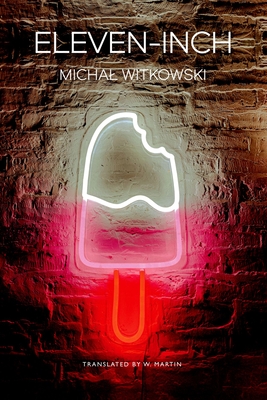POLISH WRITER Michał Witkowski’s 2019 novel Fynf und Cfancyś is now available in English as Eleven-Inch, translated by W. Martin. Set in the demimonde of Eastern European escorts, prostitutes, and hustlers, the novel is by turns a ribald, mordant, comic, and caustic picture of the early 1990s post-Communist world when the glitzy allurements of the West enticed many young Eastern Europeans to seek their fortunes far from their native land.
The narrative is a study in contrasts. The two teenage protagonists—Milan from Slovakia and Michał from Poland—could not be more different. Milan, who goes by the name and gender identity Dianka (an homage to Princess Diana), runs away to Vienna, where she plies her trade in gay bars and seedy train station bathrooms. Blonde and blue-eyed with a scrumptious face and ass, Dianka’s unfortunate fecklessness in the dangerous world of hustling puts her on a fast road to an abyss.
Michał, another beautiful teenager, has been weaned on American television shows like Dynasty. He too flees his homeland to find “real life” in Vienna. But, unlike Dianka, Michał has a knack for working the system. With his eleven-inch dick, “the most famous Schwanz in Vienna,” he is much savvier about how to capitalize on his attributes and what it takes to be a successful prostitute. He knows his customers need their ego stroked more than their cocks. In no time, Michał is racking up a steady string of high-end customers and raking in big money. He’d like occasionally just to kiss and caress and cuddle, but few of his clients go for “normal sex.” They want “to punch and pinch and fuck and slap an arse as hard as possible … no way to treat a young man,” he complains.
These complaints notwithstanding, Michał quickly becomes a “soldier of geriatric libido.” In addition to a host of older clients, others include a millionaire with a collection of designer socks that he frames and hangs on his walls; a fat, bald taxi driver with an apartment full of aquariums; and a little Goth dude with long, purple-black hair. “All kinds of people pay for sex, if they’re desperate enough.”
The only things Michał really cares about are sex and money, which he calls the “two great forces of nature that keep the wheel of history rolling along.” He concocts his own “Ten Commandments,” which includes the admonitions: “You’re your own creator. You’re all that matters. You’re only in it for yourself.”
As Michał climbs the ladder of success, Dianka crashes down. When they both move on to Zurich (a city that Witkowski viciously and uproariously savages), Michał tries to convince Dianka to upgrade to a brothel called Garden of Boys. Dianka eventually does so, giving up cruising her lurid haunts for the more secure life of a professional callboy. “I’m an escort now,” she tells herself with pride. But things don’t work out so well. Her clients turn out to be old men with double chins, hemorrhoids, and man-breasts. She leaves the brothel but, practically penniless, she finds she is unwelcome at the places she used to frequent. The few customers she manages to drum up are just as filthy and repulsive as she is. A lot of the time, they run away before paying her. In the end, she buys a ticket back to Bratislava.
Witkowski steers away from judgmental attitudes about the world of these East European hustlers. Neither does he indulge in sentimental or romantic ones. He simply presents this meretricious world in all its sad, tawdry, jaded reality, a world where rent boys have, at most, six years—from age fourteen to twenty—to make money. Older than twenty, and the market spits you out. The novel is populated by an assortment of rough trade and other unsavory types—escorts and hustlers, dope fiends, female prostitutes, Albanian pimps, Czech mafiosi, vile queens, and rich “grandpas”—a cast of characters that rivals the denizens in Brecht’s Threepenny Opera or the paintings of Max Beckmann.
Eleven-Inch is ultimately about more than the dame aux camélias world of teenage gay prostitution. It’s also a scathing portrait of the West’s obsession with beauty, money, and the baubles—bling and boys—that money can buy. The Swiss come under special fire. Obsessed with pretty chocolates wrapped in tinfoil, pedigreed cats, and the merits of various brands of dishwasher tablets, the citizens of Zurich aspire to “nothing more in life than their salary and health insurance.” Theirs is a culture of expensive waste, throw-away boys, and “an entire Alps of trash.”
Kudos to W. Martin, who, in addition to translating another of Witkowski’s novels, has brought out English versions of other modern Polish and German works of literature. A recipient of the NEA Literature Fellowship for Translation, Martin must have found this a tricky novel to translate, as the boys speak in “hustler-Esperanto”—a mishmash of German and Slavic languages. His translation reads as if it had been written in today’s street English.
But I confess to having been surprised—and amused—by Martin’s title. The original Polish title—Fynf und Cfancyś—is in bastardized German and means “twenty-five,” presumably the length of Michał’s Schwanz in centimeters. If my math is correct, twenty-five centimeters comes out to be 9.8 inches—a dick of considerable length but not an eleven incher. Perhaps the translator is a size queen, but more likely the publisher decided the extra inch would boost sales, like the socks these boys stuff inside their crotches. No matter. Witkowski’s novel is a king-size achievement in its own right.
Philip Gambone, a frequent contributor to The G&LR, is the author of five books of fiction and nonfiction.







